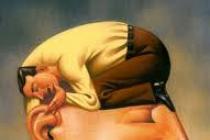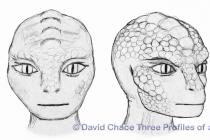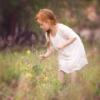The poem teaches us to understand that, despite the fact that poor people worked to exhaustion, this work brought them not only torment, but also joy. The main idea is to respect the work of ordinary people, because they also have the opportunity to enjoy life, only they need to work hard and for a long time. Summary Peasant children of Nekrasov Reading the initial lines of this amazing poetic work, we find ourselves in a small barn where a tired hunter wandered and lay down to rest. He fell asleep soundly, as he hunted for a long time, and did not hear how several pairs of inquisitive children's eyes were looking at him through the cracks, which could not understand in any way whether the man was lying alive or lifeless. Finally he woke up, and immediately he heard the iridescent song of birds. He managed to distinguish between a crow and a rook. And suddenly the stranger's gaze stumbled upon tiny nimble eyes.
Summary of Nekrasov peasant children for the reader's diary
These were the kids who looked at the stranger with great interest. They were talking quietly among themselves, and threw their eyes either at the man's ammunition or at his dog. When the children noticed that a stranger was watching them, some of them ran away.
Attention
And late in the evening it was already known that a rich gentleman had arrived at their settlement. Having settled in the village for the summer, the master enjoys beautiful places and spending time together with his children. The author describes their life in various ways, which is filled with various games.
And, of course, it is striking that all the activities of rural children are very different from the leisure of urban children. We see how some little boy bathes in the river with pleasure, another babysits his sister. A mischievous girl rides a horse. At the same time, children help adults.
"peasant children"
Pushkin "Winter Evening", "Nanny", Arina Egorovna from the novel Dubrovsky and Natalia Savishna Tolstoy. What is common between them? Grade 5-9 literature answers 5 Marsel26 / March 08, 2015, 11:56:18 Where can I find an analysis of Baratynsky's poem She? Grade 5-9 Literature answers 1 simpatYULKA007 / March 07, 2015, 05:50:07 pm How do you imagine the ball What qualities of the ball are good? 5-9 grade literature answers 2 Read also Lorazombia624 / June 23, 2014, 6:32:41 pm Why is Nekrasov's "Peasant Children" so named? What is it about? How did the hero meet the peasant children and what did he immediately like about them? Does the author himself belong to peasants? Is it possible to recognize this by his behavior and speech? What epithets and comparisons does the author give when talking about the appearance of peasant children. Why did the eyes of the children attract the author’s special attention and what did he see in them? 5-9 grade literature answers 1 Hazza133 / 07 Aug.
Nekrasov, "peasant children": analysis and summary of the work
The hunter, "tired of walking in the swamp," wandered into the barn and fell asleep. Waking up from the rays of the sun and the hubbub of birds, the narrator notices peasant children looking at him through the cracks of the barn. They watch the hunter, making witty comments.
The narrator speaks of peasant children with warmth and love, plunging into memories. He admits that sometimes he envies them, because there is more poetry in their life.The author admits how he did "mushroom raids" with the children, laid snakes on the railing of the bridge.Different people often rested under the elms, they were immediately surrounded by children and absorbed like sponges different stories: “About Kiev, about a Turk, about wonderful animals. Another will play up, so just hold on - It will start from Volochok, it will reach Kazan! the children were only happy and showed interest in the new craft.
Peasant children summary of Nekrasov n.a.
Important
Nikolai Alekseevich Nekrasov is a new trend in the history of Russian literature. He was the first to introduce the theme of the common people and filled the rhymes with colloquial turns. The life of commoners appeared, so a new style was born.
Nikolai Alekseevich became a pioneer in the combination of lyrics and satire. He dared to change its very content. "Peasant Children" by Nekrasov were written in 1861 in Greshnevo. The barn in which the narrator slept was most likely located in Shod, under the house of Gavriil Zakharov (children recognize him in the work).
At the time of writing, the poet wore a beard, which was rare for nobles, so the children questioned his origin. A rich image of peasant children The future writer was born into a simple, poor, but respected family. As a child, he often played with his peers. The guys did not perceive him as a superior and master.
Nekrasov never gave up a simple life.
All summaries in 2 minutes
- Summary
- Nekrasov N. A.
- peasant children
The author, passing by the children, attracted their attention. Many began to discuss his clothes, hairstyle and mustache, and as a result, his origin.
Children often speak loudly and impersonate their own sonorous voices. Having asked for help, they immediately run away as soon as they break something. But this prank does not cause malice in the poet. Rather, on the contrary, watching children, he "often envies them" in that they do not know abstruse theories, but still they learn the world in their own way. Dragging with the children through the forest for mushrooms, the hero comes across snakes, hedgehogs, and sometimes wolves. Looking at the animals and people passing by, the people found out where and from where they could go, what to wear and how to behave. Future peasants are simple.
Summary of peasant children, Nekrasov read
The writer calls to grow in freedom, because later it will help to love your labor bread. Completion storyline Further, the author breaks away from the memories and continues the plot with which he began the poem. The children grew bolder, and he called out to a dog named Fingal that thieves were coming.
You need to hide your belongings, said Nekrasov to the dog. The peasant children were delighted with Fingal's skills. A dog with a serious muzzle hid everything in the hay. She especially tried on the game, then lay down at the feet of the owner and growled.
Then the children themselves began to give commands to the dog. The narrator enjoyed the picture. It became dark, a thunderstorm approached. Thunder boomed. The rain fell. The spectators ran. Barefoot children raced towards the houses. Nekrasov stayed in the barn and waited out the rain, and then went with Fingal to look for great snipes.
The image of nature in the poem It is impossible not to sing the richness and beauty of Russian nature.
one more step
N.A. Nekrasov. Work Peasant children answer the questions. 1. Was it interesting for you to read this poem? 2. What did you learn about the life of peasant children? 3. How are you similar to them? 4. How are you different from them? Why? 5-9 grade literature answers 1 Vika9 / 30 sept. 2014, 0:29:22 Why Nekrasov loves Peasant children Peasant children grades 5-9 literature answers 1 Bardinalesia / 10 Dec. 2013, 18:20:40 1. Why N.A. Nekrasov writes with such love about peasant children in the poem "Peasant Children" 2. Why N.A. Nekrasov feels sorry for the peasant girl in the poem "Troika" lines of N.A. Nekrasov’s poem “Motherland” (“And here they are again, familiar places ...”), which sounds like this: “Where did I learn to endure and hate ...” Grade 5-9 literature answers 3 Detty / 21 Oct.
A small understandable retelling of the peasant children of Nekrasov
So Vanya tries his hand at harvesting bread, and then, with a majestic look, takes him home. They have no time to get sick and think about empty things. Days fly by for them instantly and happily. And all the most informative they learn from the elders. But Nekrasov also notes the other side of their fate.
These kids have no future. They play, work with pleasure, but none of them receive an education, and, accordingly, they will not become worthy and revered people in society. In the poem, Nikolai Alekseevich inserted a bright moment, which describes the labor activity of children. Once, in a cold winter, the poet, apparently hunting, meets a small child who helps his father carry firewood. It happens on such frosty days! And he is forced to help, since there are only two men in their family. Further, Nekrasov again brings us back to the beginning of the poem. The rested hunter began to show the children what a smart dog he had.
Summary Peasant children Nekasova N.A.
But then a thunderstorm began, and the children fled to their homes, and the narrator went on hunting. Read summary Peasant children. Brief summary. For a reader's diary, take 5-6 sentences. Rate:
- Grandfather Mazai and hares
- Grandfather
- Railway
- Who lives well in Russia
- peasant children
- Jack Frost
- Reflections at the front door
- Russian women
Picture or drawing Peasant children Other retellings for the reader's diary
- Summary Backsheet About Henry Two young artists, Sue and Joanna, rent a small studio together in a bohemian New York City neighborhood. In a cold November, Joanna falls seriously ill with pneumonia.
Therefore, along with the theme of love for children, Nekrasov's work "Peasant Children" glorifies the charms of life behind the gray walls of the city. From the very first lines, the author is drowning in the cooing of pigeons and the chirping of birds. Then compares the color of children's eyes with the colors in the field. The image of the earth haunts the poet in the forest when he is gathering mushrooms. From the forest it leads the reader to the river, where the children bathe, because of which the water seems to laugh and howl. Their life is inseparable from nature. Children weave wreaths of pale yellow flowers, their lips black with blueberries that set them on edge, they meet a wolf, they feed a hedgehog. The role of bread in the poem is important. Through the look of one of the boys, the narrator conveys the sacredness of growing grain. He describes the whole process from throwing a seed into the ground to baking bread in a mill. Nekrasov's poem "Peasant Children" calls to love the field forever, which gives strength and labor bread.
Sitting in a harness, the boy ordered the horse to go in a bass voice. This children's bass made the author even doubt that the world is real at all: "as if all this was cardboard." The conclusion of the author was that it was precisely in order to explore the world and frolic in the clean air that children were given childhood. To love the fields on which they grew up and keep the memory as a legacy. A legacy for future generations: they will reveal - and there is childhood that laughs so hilariously, smells so fresh and memories seem to come to life. The work of Nekrasov in poetic form has a deep meaning for the reader. It teaches that sometimes it is necessary to turn to a child on an equal basis with adults, listen to him and help him - just a little bit, otherwise he will start to be lazy - in his childhood problems. Peasant children quickly understand what work is, and this is the most valuable experience from infancy.
Oh dear rascals! Who often saw them, He, I believe, loves peasant children. N. A. Nekrasov
N. A. Nekrasov was born into a noble family. But in childhood, the future poet often secretly ran away to the peasant children. Together they went to the Volga, to the forest, picking mushrooms and berries. Having become a famous writer, Nekrasov often came to his estate, met with childhood friends and watched the children with interest and joy.
He spoke about his meeting with peasant children in the poem "Peasant Children". The poet writes about children with love and tenderness:
Chu! a whisper of some kind... but a string Along the slit of attentive eyes! All gray, brown, blue eyes Mixed like flowers in a field. They have so much peace, freedom and affection, They have so much holy kindness!
Speaking about children, the author chooses affectionate words, calls them "cute rogues." They are mischievous, reasonable, observant, although a peasant child usually "grows up without learning anything." But village children have been familiar with work since childhood. Nekrasov tells in a poem about his meeting “in the cold winter season” with the six-year-old “peasant” Vlas. He is not childishly serious: material from the site
And marching importantly, in serenity, The little man leads the horse by the bridle.
In a large family, the boy is the only assistant to his father in hard male labor. N. A. Nekrasov, who himself survived the difficult and hungry years, treats peasant children with great sympathy. He understands that a child in a peasant family will grow up, "if God pleases, and nothing prevents him from perishing."
In his poems, the poet not only wrote about love for children, but also tried to awaken the attention and sympathy of society for the fate of peasant children.
Didn't find what you were looking for? Use the search
On this page, material on the topics:
- on the. Nekrasov "peasant children" main characters
- peasant children nekrasov analysis
- retelling peasant children
- the author's attitude to peasant children
- protagonist peasant children
PEASANT CHILDREN
(abbreviated)
Again I am in the village. I go hunting
I write my verses - life is easy.
Yesterday, tired of walking in the swamp,
I wandered into the shed and fell deeply asleep.
Woke up: in the wide cracks of the barn
Cheerful sun rays are looking.
The dove coos; flying over the roof
Young rooks cry
Another bird is flying
I recognized the crow by the shadow;
Chu! some whisper ... but a string
Along the slit of attentive eyes!
All gray, brown, blue eyes
Mixed like flowers in a field.
They have so much peace, freedom and affection,
There is so much holy goodness in them!
Oh dear rascals! Who often saw them
He, I believe, loves peasant children...
I did mushroom raids with them:
He dug up the leaves, ransacked the stumps,
I tried to notice a mushroom place,
And in the morning I could not find anything.
“Look, Savosya, what a ring!”
We both bent down, and at the same time grab ...
* * *
- Enough, Vanyusha! you walked a lot
Time to get to work, dear! —
But even labor will turn first
To Vanyusha with his elegant side.
He sees how the father fertilizes the field,
Like throwing grain into loose earth,
As the field then begins to turn green,
As the ear grows, pours the grain...
So, we have to wrap up by the way
The other side of the medal.
Let's put the peasant child loose
Growing without learning
But he will grow, if God pleases,
And nothing prevents him from bending.
Suppose he knows forest paths,
Prancing on horseback, not afraid of water,
But mercilessly eat his midges,
But he was early familiar with the works ...
Once upon a time in the cold winter time
I came out of the forest; there was severe frost.
I look, it rises slowly uphill
Horse carrying firewood
And, marching importantly, in serenity,
A man is leading a horse by the bridle
In big boots, in a sheepskin coat,
In big mittens ... and himself with a fingernail!
- Hello, boy! - "Go past yourself!"
“You are painfully formidable, as I see it!”
Where are the firewood from? - “From the forest, of course;
Father, you hear, cuts, and I take away.
(The woodcutter's ax was heard in the forest.)
- Does your father have a big family? —
“The family is big, yes two people
All the men, something: my father and I ... "
"So that's it! And what's your name?" - Vlas.
- And what year are you? - "The sixth passed ...
Well, dead!" shouted the little one in a bass voice,
He jerked by the bridle and walked faster ...
Enough, Vanya! You walked a lot, It's time for work, dear! - But even work will first turn to Vanyusha with its elegant side. He sees how his father fertilizes the field, How he throws grain into the loose earth, How the field then begins to turn green, How the ear grows, pours grain ... So, by the way, we are obliged to wrap the other side of the medal. Suppose a peasant child grows freely, without learning anything, But he will grow up, if God pleases, And nothing prevents him from bending. Suppose he knows the forest paths, Prancing on horseback, not afraid of water, But mercilessly eat his midges, But he is familiar with the works early ... * * * Once, in the cold winter season, I came out of the forest; there was severe frost. I look, slowly ascending the mountain A horse carrying a cart of brushwood, And, marching importantly, in serenity, The horse is led by the bridle by a peasant In big boots, in a sheepskin sheepskin coat, In large mittens ...
Nekrasov, "peasant children": analysis and summary of the work
Enough, Vanya! You walked a lot, It's time for work, dear! - But even work will first turn to Vanyusha with its elegant side. He sees how his father fertilizes the field, how he throws grain into the loose earth, how the field then begins to turn green, how the ear grows, pours grain ...
So, by the way, we are obliged to wrap the other side of the medal. Suppose a peasant child grows freely, without learning anything, But he will grow up, if God pleases, And nothing prevents him from bending.
Attention
Suppose he knows the forest paths, Prancing on horseback, not afraid of water, But mercilessly eat his midges, But he is familiar with the works early ... * * * Once, in the cold winter season, I came out of the forest; there was severe frost. I look, slowly ascending the mountain A horse carrying a cart of brushwood, And, marching importantly, in serenity, The horse is led by the bridle by a peasant In big boots, in a sheepskin sheepskin coat, In large mittens ...
Summary of Nekrasov peasant children for the reader's diary
However, it would be a pity to sow envy in a noble child. It would be a pity for us to sow. paths, Prancing on horseback, not afraid of water, But mercilessly eat his midges, But he is familiar with the works early ... Once, in a cold winter season, I left the forest; there was a severe frost.
Summary of peasant children, Nekrasov read
- Nekrasov
- peasant children
Nikolai Alekseevich Nekrasov is one of the few classical poets who created works about the existence of ordinary people. One of these creations is the charming poem "Peasant Children", which tells that once a hunter came into a village barn, who, due to fatigue, forgot to sleep.
And the traveler is discovered by children living in a small village. They look at him with surprise and discuss it loudly.
Important
The poet immediately depicts his childhood with peasant children, and also imagines how they supported adults. And although they worked willingly, the work also caused them unbearable torments, starting from impotence in the face of heat and severe frosts.
"peasant children"
They are interested in legends and stories, they do not even shy away from the work of the carpenter, which is mentioned in the poem. Despite all the problems, they are happy in their corner of paradise.
The author says that such guys have nothing to pity and hate, they need to be envied, because the children of the rich do not have such color and freedom. Introduction to the poem through the plot Nekrasov's poem "Peasant Children" begins with a description of the previous few days.
The narrator was hunting and, tired, wandered into the barn, where he fell asleep. He was awakened by the sun that was breaking through the cracks. He heard the voices of birds and recognized the doves and rooks.
I recognized the crow by the shadow. Eyes were looking at him different color in which there was peace, affection and kindness. He realized that these were the views of children. The poet is sure that only children can have such eyes.
They quietly commented among themselves on what they had seen. One looked at the narrator's beard and long legs, the other at the big dog.
Hello boy!" - "Go past yourself!" - "You are painfully formidable, as I see it! Where are the firewood from?" - “From the forest, of course; Father, you hear, he is chopping, and I am taking it away.” (A woodcutter’s ax was heard in the forest.) then: my father and I ... "-" So there it is! And what is your name?” - “Vlasom” - “And what year are you?” - "The sixth passed ... Well, dead!" - the little one shouted in a bass voice, He jerked by the bridle and walked faster. The sun shone so much on this picture, The child was so hilariously small, As if all this was cardboard, As if I had got into a children's theater! But the boy was a living, real boy, And firewood, and brushwood, and a piebald horse, And snow, lying to the windows of the village, And a cold fire of the winter sun - Everything.
Summary Peasant children Nekasova N.A.
include("body.tpl"); ? Again I am in the village. I go hunting, I write my verses - life is easy. Yesterday, tired of walking through the swamp, I wandered into the barn and fell deeply asleep. Flying over the roof, Young rooks are screaming, Some other bird is also flying - By the shadow I recognized the crow just in time; some whisper ... but a string Along the slit of attentive eyes! All gray, brown, blue eyes - Mixed like flowers in a field. They have so much peace, freedom and affection, They have so much holy kindness! I always recognize. I froze: tenderness touched the soul ... Chu! whisper again! FIRST G O L O S Beard! SECOND A sir, they said! .. Third Slow down, you devils! The second bar does not have a beard - a mustache.
FIRST And the legs are long, like poles.
Nekrasov, "Peasant children";: analysis and summary of the work
I write my verses - life is easy. Yesterday, tired of walking through the swamp, I wandered into the shed and fell deeply asleep. I woke up: in the wide cracks of the barn, the rays of the cheerful sun look.
The dove coos; Flying over the roof, Young rooks are crying, Some other bird is also flying - I recognized the crow just by the shadow; Chu! some whisper... but a string along the crack of attentive eyes! All gray, brown, blue eyes Mixed like flowers in a field. They have so much peace, freedom and affection, They have so much holy kindness! Oh dear rascals! Who often saw them, He, I believe, loves peasant children ... I made mushroom raids with them: I dug up the leaves, ransacked the stumps, I tried to spot a mushroom place, And in the morning I could not find it for anything. “Look, Savosya, what a ring!” We both bent down, and grabbed it at once ...
Nekrasov N.A. - peasant children
The poem teaches us to understand that, despite the fact that poor people worked to exhaustion, this work brought them not only torment, but also joy. The main idea is to respect the work of ordinary people, because they also have the opportunity to enjoy life, only they need to work hard and for a long time.
Info
Summary Peasant children of Nekrasov Reading the initial lines of this amazing poetic work, we find ourselves in a small barn where a tired hunter wandered and lay down to rest. He fell asleep soundly, as he hunted for a long time, and did not hear how several pairs of inquisitive children's eyes were looking at him through the cracks, which could not understand in any way whether the man was lying alive or lifeless.
Finally he woke up, and immediately he heard the iridescent song of birds. He managed to distinguish between a crow and a rook. And suddenly the stranger's gaze stumbled upon tiny nimble eyes.
Summary of the poem peasant children Nekrasov
He was interested in discovering new worlds. Therefore, probably, he was one of the first to introduce the image of a simple person into high poetry. It was Nekrasov who noticed the beauty in rural images. Other writers later followed suit. A movement of followers was formed who wrote like Nekrasov. "Peasant children" (an analysis of which can be carried out based on the historical period in which the poem was written) stands out noticeably from the entire work of the poet. In other works there is more grief. And these children are full of happiness, although the author does not have high hopes for their bright future. Babies do not have time to get sick and think about the unnecessary. Their life is full of colors of nature in which they were lucky to live.
They are hardworking and simply wise. Every day is an adventure. At the same time, children bit by bit absorb science from their elders.
Summary of Nekrasov's story peasant children
The writer calls to grow in freedom, because later it will help to love your labor bread. Completion of the storyline Further, the author breaks away from the memories and continues the plot with which he began the poem.
The children grew bolder, and he called out to a dog named Fingal that thieves were coming. You need to hide your belongings, said Nekrasov to the dog. The peasant children were delighted with Fingal's skills.
A dog with a serious muzzle hid everything in the hay. She especially tried on the game, then lay down at the feet of the owner and growled.
The spectators ran. Barefoot children raced towards the houses. Nekrasov stayed in the barn and waited out the rain, and then went with Fingal to look for great snipes. The image of nature in the poem It is impossible not to sing the richness and beauty of Russian nature.
They are interested in legends and stories, they do not even shy away from the work of the carpenter, which is mentioned in the poem. Despite all the problems, they are happy in their corner of paradise. The author says that such guys have nothing to pity and hate, they need to be envied, because the children of the rich do not have such color and freedom. Introduction to the poem through the plot Nekrasov's poem "Peasant Children" begins with a description of the previous few days.
The narrator was hunting and, tired, wandered into the barn, where he fell asleep. He was awakened by the sun that was breaking through the cracks. He heard the voices of birds and recognized the doves and rooks.
I recognized the crow by the shadow. Eyes of different colors looked at him through the crack, in which there was peace, affection and kindness. He realized that these were the views of children. The poet is sure that only children can have such eyes. They quietly commented among themselves on what they had seen. One looked at the narrator's beard and long legs, the other at the big dog.
Did you like the poem? If yes, then what? What do you remember most about her? Why?
In assessing the poem, fifth-graders are unanimous: I liked it very much! I liked the fact that it is about real life, there is both funny and sad in it, that it is written very “well-organized” and the language of the poem is close to folk.
Most of all, of course, the children remember the author's meeting with the "little man" in the winter forest, his communication with peasant children, when he, together with them, gives commands to his dog Fingal. These are live scenes where the characters are not only described by the author, but also speak, act, and make their own assessments.
Tell me, with what feeling does Nekrasov talk about peasant children? Find words and expressions in the poem that help us feel his attitude towards children. Is it possible to say that the author admires them, loves them?
The poet talks about peasant children with love and even tenderness, this is indicated by words with diminutive suffixes that he uses in their description (“eyes”, “eyes”, “man”, “little”, etc.). Nekrasov calls children "dear rogues", says: I love the expression of a child's eye,
I always recognize him.
I froze: tenderness touched the soul ...
Who often saw them
He, I believe, loves peasant children ...
He admires the eyes of the children and exclaims:
They have so much peace, freedom and affection,
There is so much holy goodness in them!
The poet describes with pleasure their games, hikes in the forest, admires their spontaneity, openness, curiosity: “The guys will surround: stories will begin ...”, “How you saw, how you tinker - show them everything.” The poet wishes them well: “Play, children! Grow at will"
And how do children initially relate to the poet? Why? What words show this attitude? Find them.
At first, the kids are afraid of an unfamiliar hunter, because he is not very similar to others whom they have seen before: he has a beard, and “a bar does not have a beard - a mustache” (according to the customs of that time, only peasants wore beards, bare beards were shaved), watches for some reason, the stranger has a hat on, he is the owner of an expensive gun: “A gun! look at it: the locks are carved ... "The children saw all these details, watching the hunter through the cracks of the barn, trying to talk in a whisper and fearing that he would hear them and" beat them.
What happened to me - they marveled at everything
And my sentence was pronounced:
“What a goose like that!
I would lie on the stove!
And you can see not a gentleman: how he was driving from a swamp,
So next to Gavrila ...
Why do children call a stranger "goose"? He seems to them an important person, special. That raises some concern.
And why do children cease to be afraid of a stranger? As a result, they found a common
tongue with him?
The children felt his kindness, the hunter began to play with them, and a hunting dog helped him, who knew perfectly "dog science":
He started throwing things like this
That the audience could not leave the place.
They wonder, they laugh! There is no fear here!
Command themselves! - Fingalka, die!
“Don’t stop, Sergey! Don't push, Kuzyaha!
Look - it's dying - look!
I myself enjoyed lying in the hay,
Their noisy fun.
Can all parts of the poem be called funny? Why? And what are possible?
No, the whole poem cannot be called a comedy. It is not at all funny when the author talks about a six-year-old child who “during the cold winter season” carries brushwood from the forest.
It’s not funny when we hear bitter words that a peasant child “works early” and nothing prevents him from “bending” ... We laugh when Nekrasov talks about how his children looked at him, how the dogs rejoiced at the tricks, how they accepted the snake for a ring. So the name "Children's Comedy" would not quite correspond to the content of the poem.
The title "Peasant Children" is broader and more precise: after all, the poem tells not only about the episode of the poet's meeting with peasant children, but also about other moments of his life) includes memories of childhood and reflections on the life and fate of peasant children.
We turn to the analysis of the main part of the poem. Nekrasov paints a collective portrait of peasant children. At the same time, he uses many artistic techniques, and one of his favorite and expressive ones is comparison.
Find in the poem those comparisons with which he creates this collective portrait.
All gray, brown, blue eyes -
Mixed like flowers in a field.
***
My spies are afraid
And they rushed away: they heard a man,
So a flock of sparrows fly from the chaff.
***
And Russ" heads over the desert river
Where do you get all these comparisons? What unites them? (All comparisons are from the natural world.)
Why does Nekrasov use comparisons from the natural world to describe peasant children?
Peasant children grow up and live among meadows) fields) forests, they know mushrooms, berries, herbs, birds well:
Ooh, it's hot! .. Picked mushrooms until noon)
Here they came out of the forest - just towards
A blue ribbon, winding, long,
Meadow river: jumped off in a crowd
And blond heads over the desert river.
What porcini mushrooms in a forest clearing!
The river resounded with laughter and howling:
A fight is not a fight, a game is not a game ...
And the sun scorches them with midday heat.
Home, kids! it's time to dine.
They returned: everyone has a basket full,
And how many stories! Got scythe
Caught a hedgehog, got lost a little
And they saw a wolf ... oh, what a terrible one!
The hedgehog is offered both flies and boogers,
Roots gave him his milk -
Doesn't drink! retreated...
Who catches leeches
On the lava, where the uterus beats the linen,
Who nurses his sister, two-year-old Glashka)
Who drags a bucket of kvass on the harvest;
And he, having tied a shirt under his throat,
Something mysteriously draws in the sand;
That one got into a puddle, and this one with a new one
I wove myself a glorious wreath:
All white, yellow, lavender,
Yes, occasionally a red flower.
Those sleep in the sun, those dance squatting.
Here is a girl catching a horse with a basket:
Caught, jumped up and rides on it.
Comparisons help to make the portrait of the children very lively, vivid, and memorable.
What else allows us to see these kids? (Description of their actions, fun, activities, live conversational speech.)
Find in their speech such words and expressions that we do not use, and those that convey the flavor of folk speech. (“Look at it”, “tea”, “out”, “trunk”, “such and such a goose is really a hunt”, “just”, “very well”, “do not catch”, etc.)
What are the children like before us?
They are inquisitive and curious, they love interesting stories, they know forest paths, plants and inhabitants of the forest well, they are cheerful, independent, they work together with their parents.
How are the portraits of these boys similar?
We see both of them working together with their parents. Can we prove that work for them is not a punishment, not a duty, that they are proud of their participation in the work of their parents?
Vanyusha closely follows the work of his parents in the field, tries to help them:
He sees how the father fertilizes the field,
Like throwing grain into loose earth,
As the field then begins to turn green,
As the ear grows, it pours grain.
The ready harvest will be pruned with sickles,
They will knit them in sheaves, they will take them to the barn,
Dry, beaten, beaten with flails,
The mill will grind and bake bread.
A child will taste fresh bread
And in the field he more willingly runs after his father.
Explain the expression "Vanyusha enters the village as a king."
The boy, apparently, was at the hayfield with his parents. Now they are returning home with a convoy of hay, on top of which Vanyusha sits. He is proud that he helped his parents, he rejoices that now he is above everyone else, and therefore he “enters the village as a king”.
And the “man with a fingernail” feels like a full participant in adult labor:
“Father, you hear, he cuts, and I take him away.” Why does Nekrasov say that the boy is not walking, but walking? Explain the words: and walking importantly, in serenity, the horse is led by the bridle by a peasant ...
The boy feels the importance and necessity of his participation in the preparation of brushwood: the warmth in the hut depends on this. He is proud that he was entrusted with such an important task, and therefore he does not go, but marches, as important persons, statesmen, kings march. In this sense, they are similar to Vanyusha.
What strikes the poet in the figure of the boy he met in the winter forest?
He is amazed that “in the cold winter season”, in “hard frost” he meets a child in the forest:
A man is leading a horse by the bridle
In big boots, in a sheepskin coat,
In large mittens ... and he himself with a fingernail!
All the clothes are clearly not for him (it means that he simply does not have his own!), He is tiny, but is already engaged in hard work. Find in the poem the words-synonyms that the boy is called. (“Man with a fingernail”, “lad”, “man”, “little”, “child”)
Which of these synonyms express admiration? And in what synonym is the assessment of oneself a boy expressed?
The appeal of the boy sounds ironic, the word peasant conveys the author's admiration for the boy's independence, the little one conveys the poet's sympathy for the child. But the child himself calls himself a man, as an adult: “... yes, two people / All men, something: my father and me ...” This is how a six-year-old boy sees and evaluates himself.
What helps us understand this synonymous series?
Thanks to him, we understand that a small child should not do hard physical labor in the winter forest, that he does it not from a good life, but because there is no one else to do it, and at the age of six the boy feels like an adult, he becomes independent early .
Why does Nekrasov's picture, which he saw at the edge of the forest, evoke a feeling of something unreal, theatrical?
The sun shone on this picture
The baby was so hilariously small
It's like it was all cardboard.
As if I were in a children's theater.
But the boy was a living, real boy,
And firewood, and brushwood, And a light horse,
And the snow, lying to the windows of the village,
And the cold fire of the winter sun -
Everything, everything was real Russian…
The child is too small, his appearance in his father's boots and short fur coat is too ridiculous,
somehow it doesn’t fit in my head that such a crumb should carry brushwood from the forest in a “hard frost” ...
What thoughts does this meeting give rise to in the poet?
Those honest thoughts that have no share,
To whom there is no death - do not press,
In which there is so much anger and pain,
In which there is so much love!
What makes the poet suffer? Why can't you get rid of "honest thoughts"? Why in these thoughts, along with anger and pain, "so much love"?
The poet is made to suffer by the unjust structure of society, which can allow child labor. And there is no getting away from these thoughts, because childhood is given to children for joy, so that they grow up “in the wild”. And the pain of the poet is born of love for peasant children, pure in soul, direct, inquisitive, hardworking.
Let's think about the following lines:
Play on, children! Grow at will!
That's why you have been given a red childhood,
To forever love this meager field,
So that it always seems sweet to you.
Keep your age-old legacy
Love your labor bread -
And let the charm of childhood poetry
Leads you into the bowels of the native land! ..
What do children from the “red childhood” take with them into adulthood?
From childhood, they learn to love their native land, to cultivate it, they learn to love "their working bread."
Why do you think the poet chose the epithet meager to characterize his native land, which the field represents?
Meager means barren, emaciated, poor. Such a field requires especially a lot of care and work. It is easy to love a fertile field with rich soil, but the one in which you invest more labor and effort (in this case, the "meager field"), and you love more, it becomes a part of you.
The poet calls the "meager field" the "age-old inheritance" of children. What does he mean?
This is the land of the ancestors, this is the motherland, it keeps the traditions, culture, history of the family, the people ... The ashes of the ancestors rest in it, and those who are now playing in the wild will also leave in it. The main thing is that they love this land, no matter what, teach their children to love it. This is the only way to preserve the clan, the people, the homeland.
3 / 5. 1














